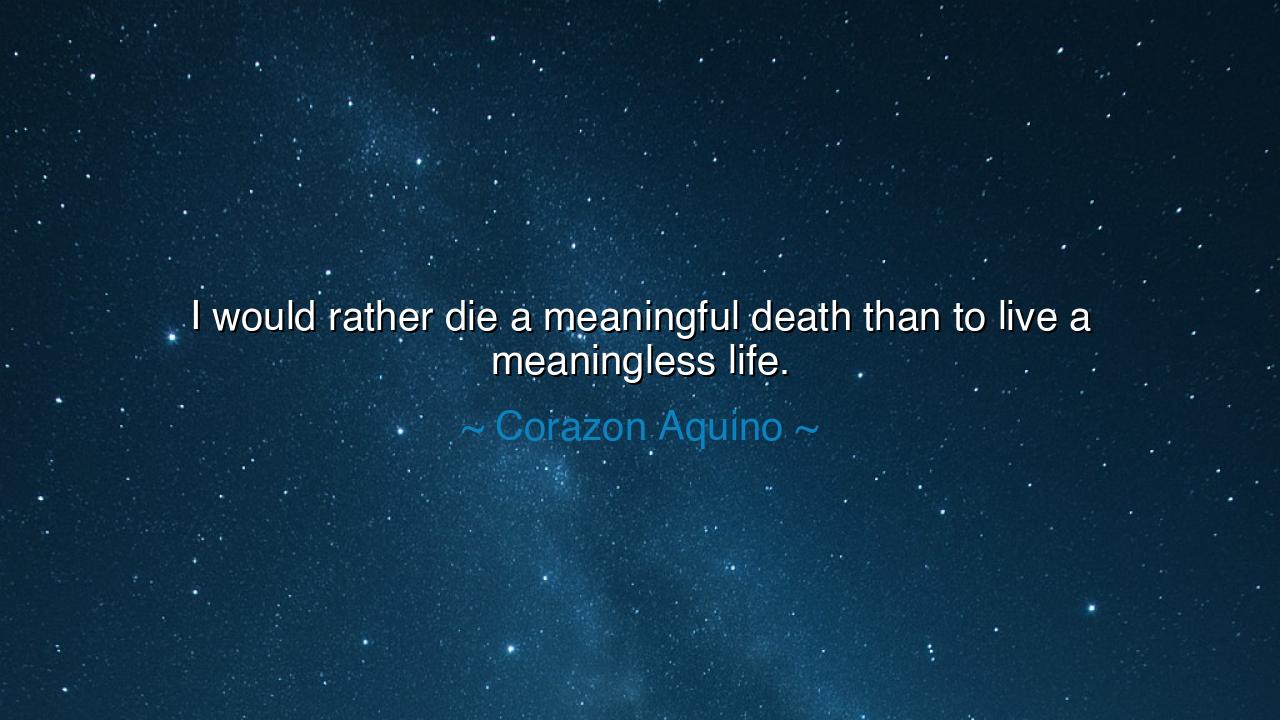
I would rather die a meaningful death than to live a meaningless






The noble and courageous Corazon Aquino, the first female president of the Philippines and a symbol of peace through strength, once declared: “I would rather die a meaningful death than to live a meaningless life.” These words, born not from comfort but from conviction, resound like a clarion call through the corridors of time. They speak of the eternal struggle between fear and purpose, between survival and sacrifice. In her voice, we hear not the trembling of one who clings to life, but the steadfastness of one who understands that life without purpose is a slower death than dying for truth. Hers was the courage of one who believed that the value of a soul lies not in its length of days, but in the light it leaves behind.
To die a meaningful death is not to seek martyrdom for glory’s sake, but to live—and if need be, to perish—for something greater than oneself. It is the essence of nobility that the ancients revered: that a person’s worth is not measured by how safely they lived, but by what they were willing to risk for love, justice, and truth. Corazon Aquino’s words echo the wisdom of those who understood that life’s true measure lies in its depth, not its duration. To live meaninglessly—chained to comfort, indifferent to suffering, silent in the face of injustice—is to forfeit the divine purpose for which we were born. A life without meaning is a candle that burns but gives no light; it flickers, it fades, and it leaves nothing behind but smoke.
The origin of this quote is found in the turbulent history of the Philippines. Aquino spoke these words during her nation’s darkest hour, when tyranny cast its shadow across the land. Her husband, Benigno “Ninoy” Aquino Jr., a man of unyielding courage, had been imprisoned and exiled for opposing a corrupt dictatorship. When he returned to his homeland in 1983 to continue the struggle for democracy, he was assassinated upon arrival—his blood becoming the seed of a revolution. Corazon, a humble woman who had never sought power, rose from grief to lead her people in the peaceful uprising known as the People Power Revolution. With faith as her armor and the truth as her weapon, she faced armies and despots not with violence, but with conviction. In that crucible of history, her words were no mere sentiment—they were the living creed of her soul.
Her declaration recalls the spirit of Socrates, who chose to drink the cup of hemlock rather than betray his principles. It mirrors the resolve of Joan of Arc, who walked through flames for the freedom of her people. And it shines with the same sacred fire that burned in Mahatma Gandhi and Martin Luther King Jr., who both gave their lives so that others might live in dignity. In each of these souls, the same truth was alive—that the meaning of life is not found in the avoidance of death, but in the embrace of purpose. Corazon Aquino joined that lineage of light-bearers, proving that even a gentle heart can be a mighty force when guided by moral clarity.
When Aquino said she would rather die a meaningful death, she was not speaking of resignation, but of transcendence. Her words carry within them the wisdom that life and death are not opposites, but continuations of one another. To die meaningfully is to leave behind a legacy that breathes long after one’s body is gone. Her life reminds us that even the quietest person, when moved by conviction, can awaken a nation. Her faith in God, her humility, and her unshakable hope turned her suffering into strength. In choosing meaning over safety, she gave her people not only freedom, but an enduring example of courage.
This quote also warns us against the emptiness of a meaningless life—a life lived in fear, apathy, or selfishness. Such existence, though long, is hollow. It is easy to chase comfort, to silence the conscience, to let the world pass by without resistance. But the ancients knew, as Aquino did, that such a life is a form of death long before the body ceases to breathe. To live truly, one must stand for something eternal—for love, for truth, for the dignity of all living souls. Only then does one’s life become part of something greater than the self, woven into the grand tapestry of history and spirit.
So, my child, take this lesson into your heart: live not merely to survive, but to serve. Seek meaning in your days, and let your actions spring from courage rather than fear. Do not waste your breath on comfort that leaves no legacy. Stand firm for what is right, even when the cost is great, for the value of your life will be measured not by how long you live, but by what you give. Ask yourself, “What truth am I willing to live—and, if fate demands, to die—for?” In the answer to that question lies your destiny.
For in the end, Corazon Aquino’s words are not only a tribute to her own courage—they are a challenge to all who live in complacency. To die a meaningful death is the final act of a life well lived; to live meaningfully is the daily act of choosing purpose over ease. Let your life, then, be a torch lit by conviction, so that when your time comes, you will not fear death—for you will know that your light will burn on in the hearts of others, just as hers continues to burn across the generations.






AAdministratorAdministrator
Welcome, honored guests. Please leave a comment, we will respond soon